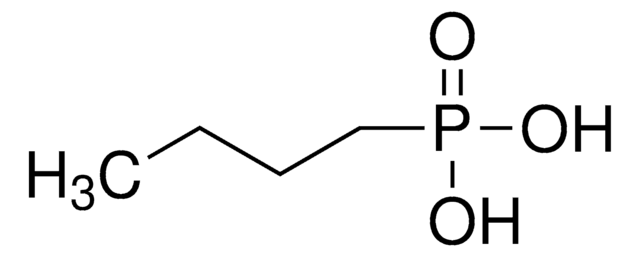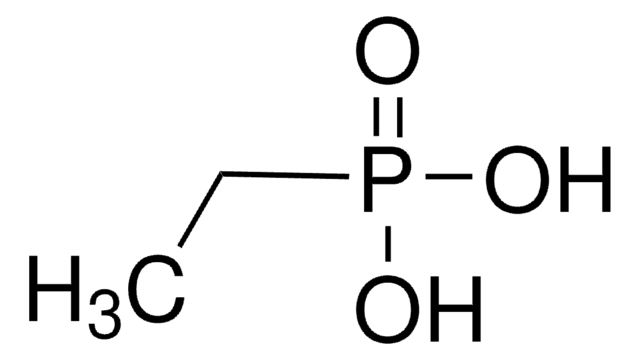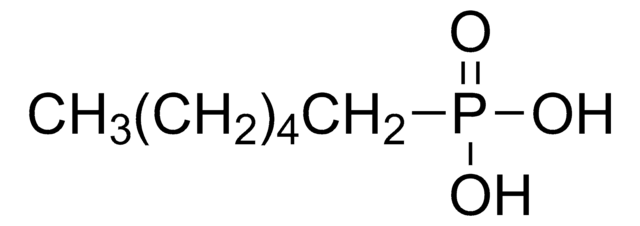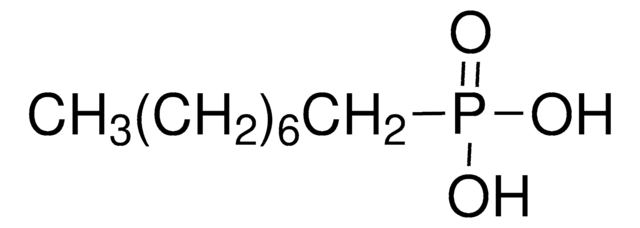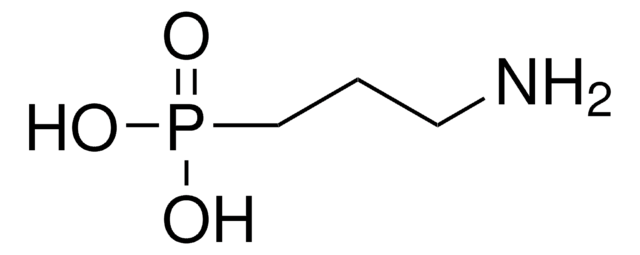305685
Propylphosphonic acid
95%
Synonym(s):
Dihydrogen propylphosphonate, P-Propylphosphonic acid, Propanephosphonic acid, Propylphosphonic acid anhydride, n-Propylphosphonic acid
Sign Into View Organizational & Contract Pricing
All Photos(2)
About This Item
Linear Formula:
CH3CH2CH2P(O)(OH)2
CAS Number:
Molecular Weight:
124.08
EC Number:
MDL number:
UNSPSC Code:
12352100
PubChem Substance ID:
NACRES:
NA.22
Recommended Products
General description
Propylphosphonic acid is an alkylphosphonic acid. It is an important marker of extremely toxic nerve agents.
Application
Propylphosphonic acid was used in generation of free radicals, to investigate the inactivation of Aeromonas hydrophila by free radicals, generated spontaneously in oxidizing Fe2+-containing groundwaters.1
Signal Word
Danger
Hazard Statements
Precautionary Statements
Hazard Classifications
Skin Corr. 1B
Storage Class Code
8A - Combustible corrosive hazardous materials
WGK
WGK 1
Flash Point(F)
Not applicable
Flash Point(C)
Not applicable
Personal Protective Equipment
dust mask type N95 (US), Eyeshields, Gloves
Choose from one of the most recent versions:
Already Own This Product?
Find documentation for the products that you have recently purchased in the Document Library.
Customers Also Viewed
Jens Martens-Lobenhoffer et al.
Journal of chromatography. B, Analytical technologies in the biomedical and life sciences, 990, 164-168 (2015-04-16)
Fosfomycin is a small, hydrophilic antibiotic drug with activity against Gram-positive as well as Gram-negative pathogens. It is in increasing use in intensive care units as a last line antibiotic since it shares no cross-resistance with other antibiotics. It is
Inactivation of Aeromonas hydrophila by Fe(II)-related-radical generation in oxidizing groundwaters.
I Kersters et al.
Applied and environmental microbiology, 62(9), 3277-3283 (1996-09-01)
The survival of Aeromonas hydrophila AWWX1 in filter-sterilized phreatic groundwaters was studied by using viable counts. Aeromonas counts rapidly decreased 2 to 3 log units in oxidizing raw groundwaters from Snellegem and Beernem, Belgium (Snellegem-raw and Beernem-raw, respectively), containing high
Tomas Drevinskas et al.
Analytical methods : advancing methods and applications, 12(41), 4977-4986 (2020-10-03)
Hazardous remote places exist in the world. Why should health or life be risked sending a scientist to the investigation site, as the remote analytical instrumentation exists? Different scientific fields require instruments that could be used on-site (in situ), therefore
Arnaud Demortière et al.
The journal of physical chemistry letters, 9(8), 1900-1906 (2018-03-29)
Colloidal semiconductor nanocrystals are commonly grown with a shell of a second semiconductor material to obtain desired physical properties, such as increased photoluminescence quantum yield. However, the growth of a lattice-mismatched shell results in strain within the nanocrystal, and this
Deepak Pardasani et al.
Journal of chromatography. A, 1141(2), 151-157 (2006-12-19)
Alkylphosphonic acids (APAs), particularly the methyl-, ethyl-, isopropyl- and n-propyl-phosphonic acids are important markers of extremely toxic nerve agents. Hence, their detection and identification is of vital importance to verification of chemical weapons convention (CWC). Verification analysis of CWC requires
Our team of scientists has experience in all areas of research including Life Science, Material Science, Chemical Synthesis, Chromatography, Analytical and many others.
Contact Technical Service